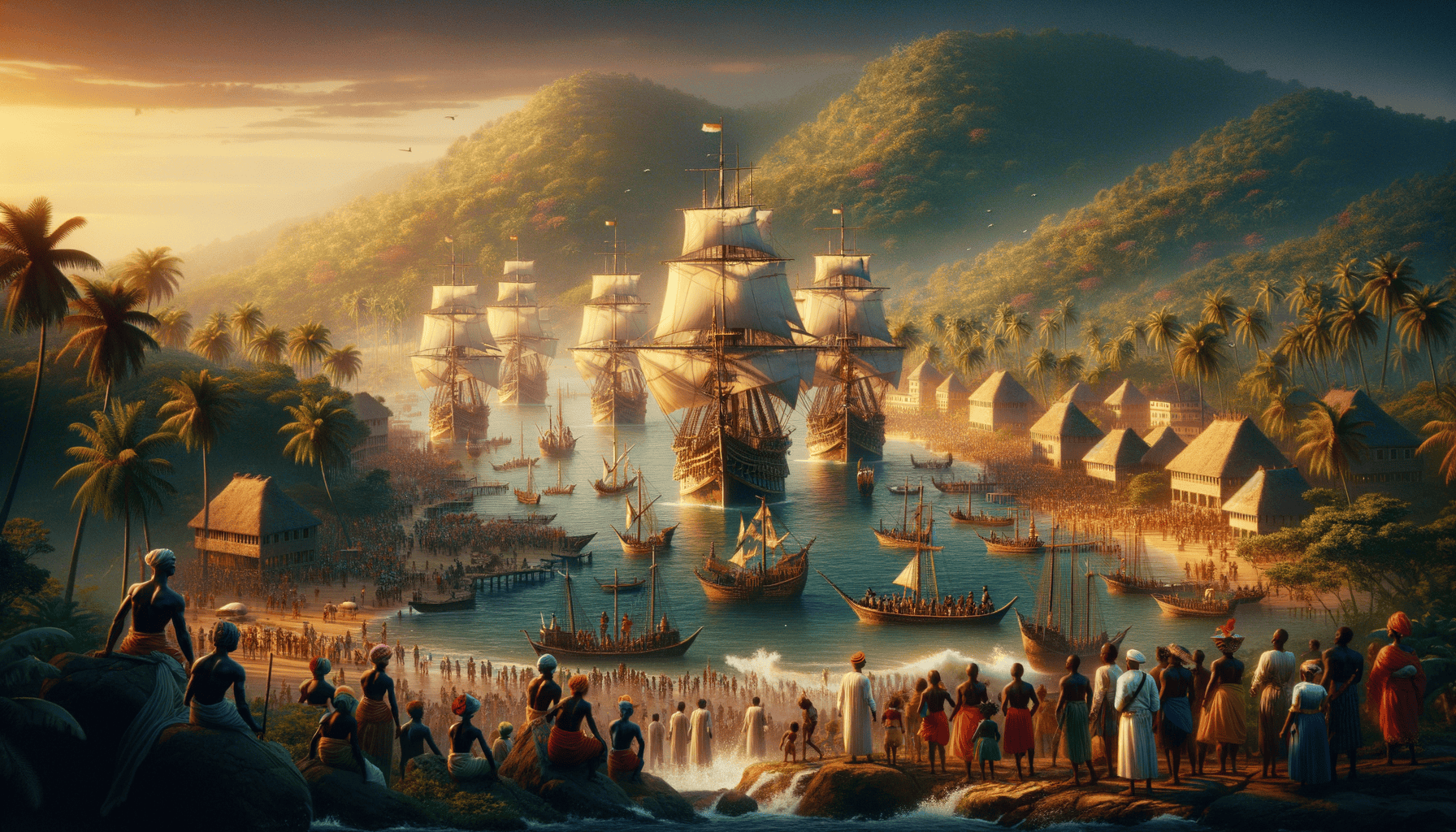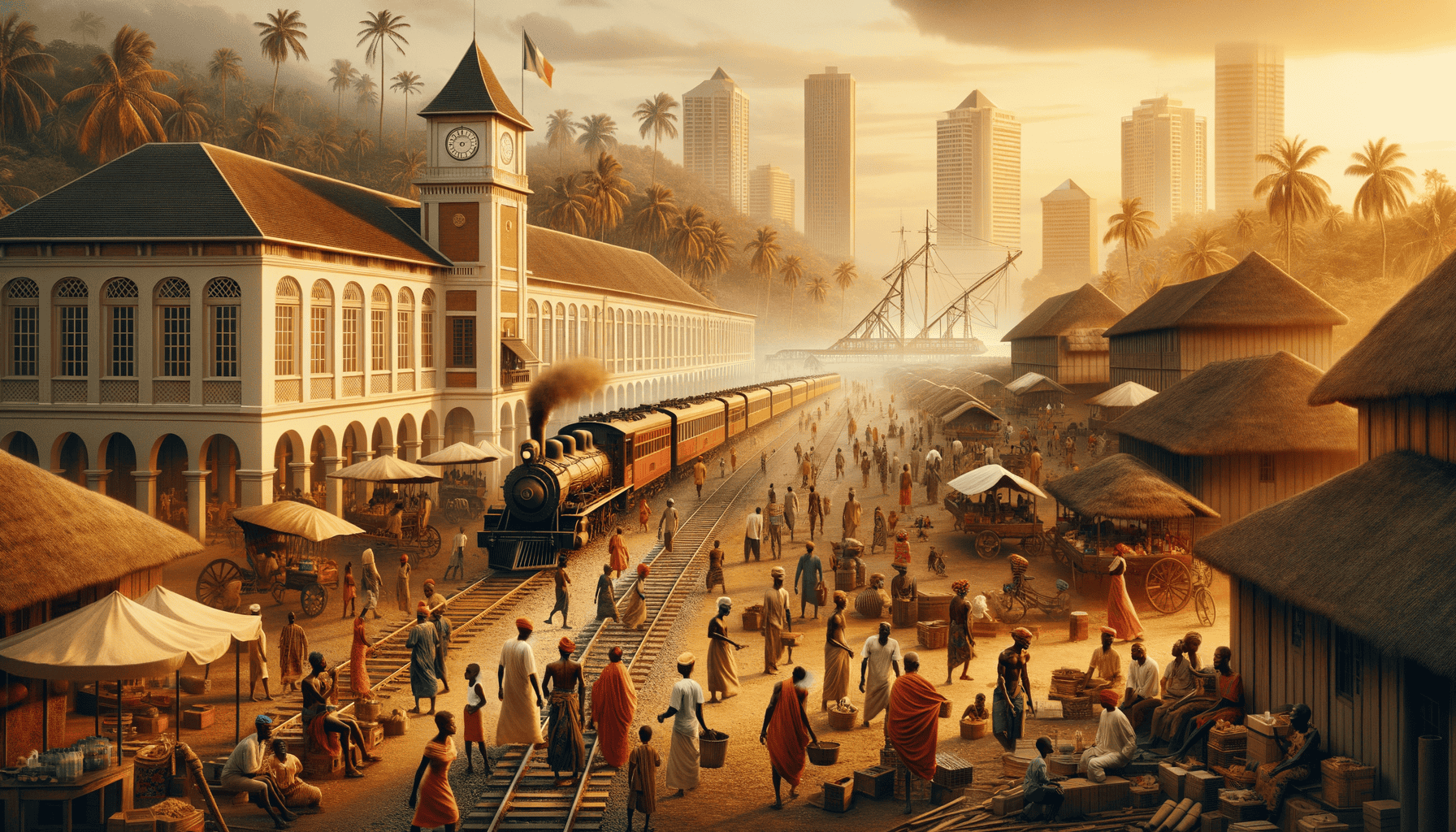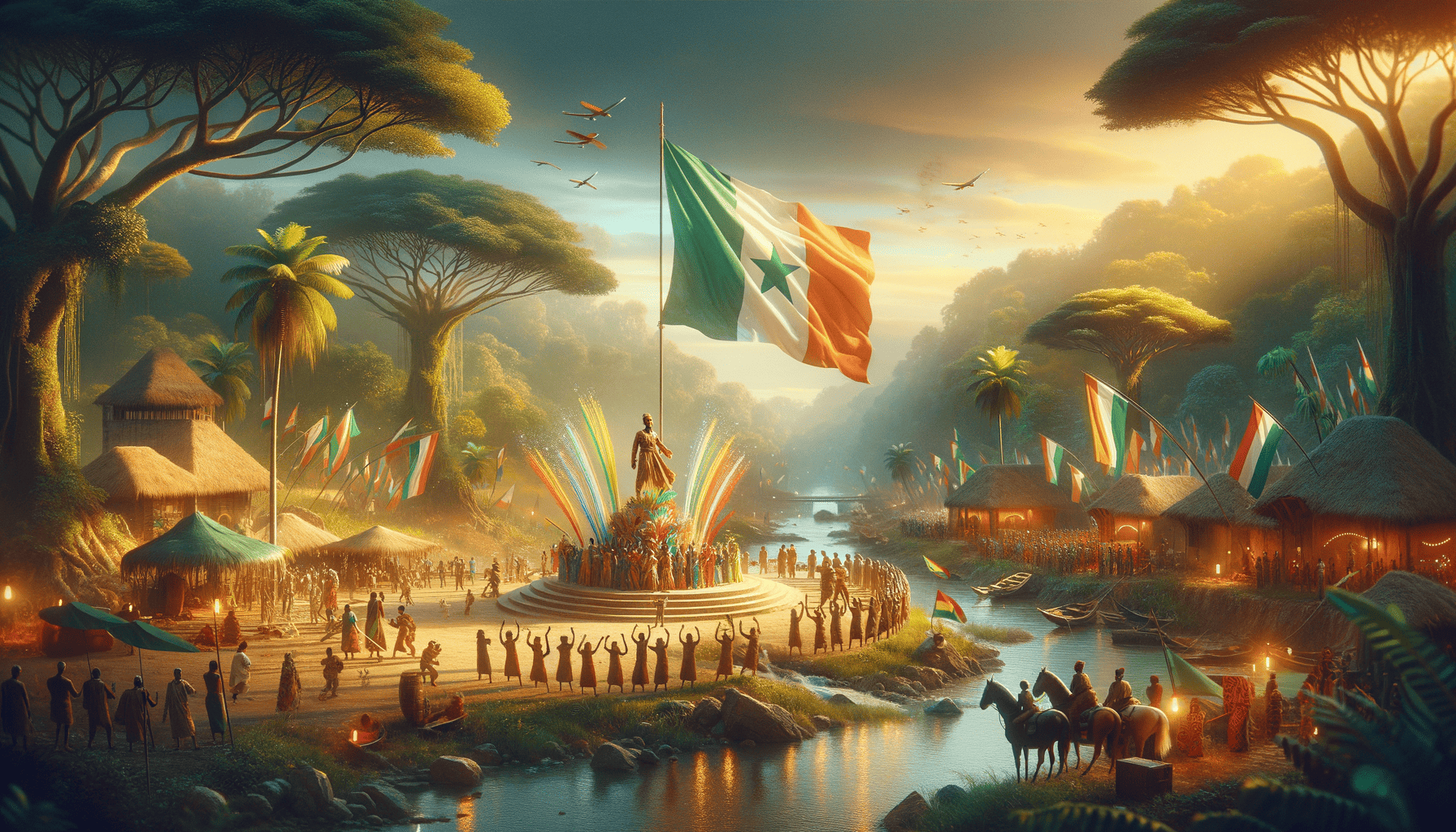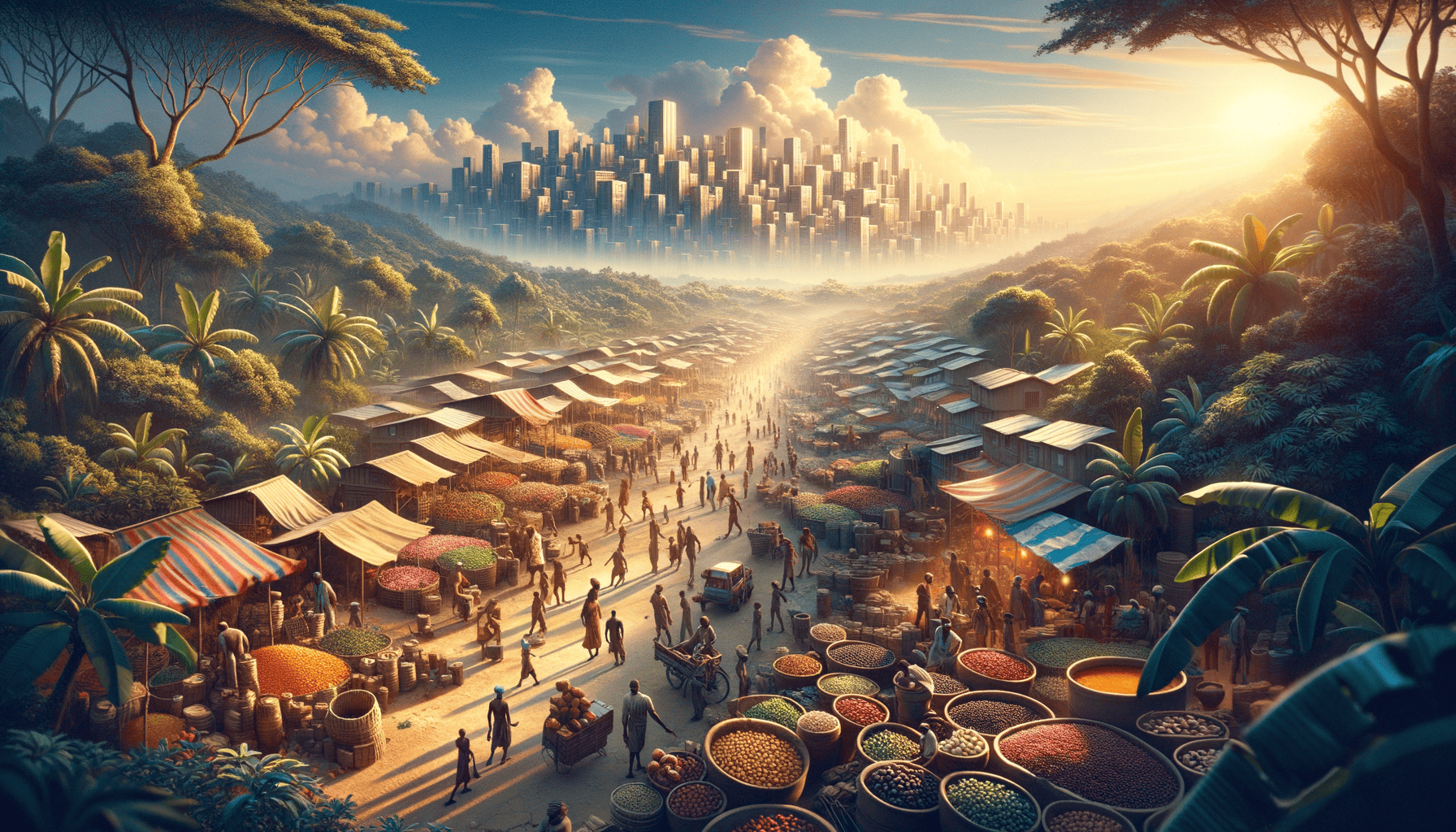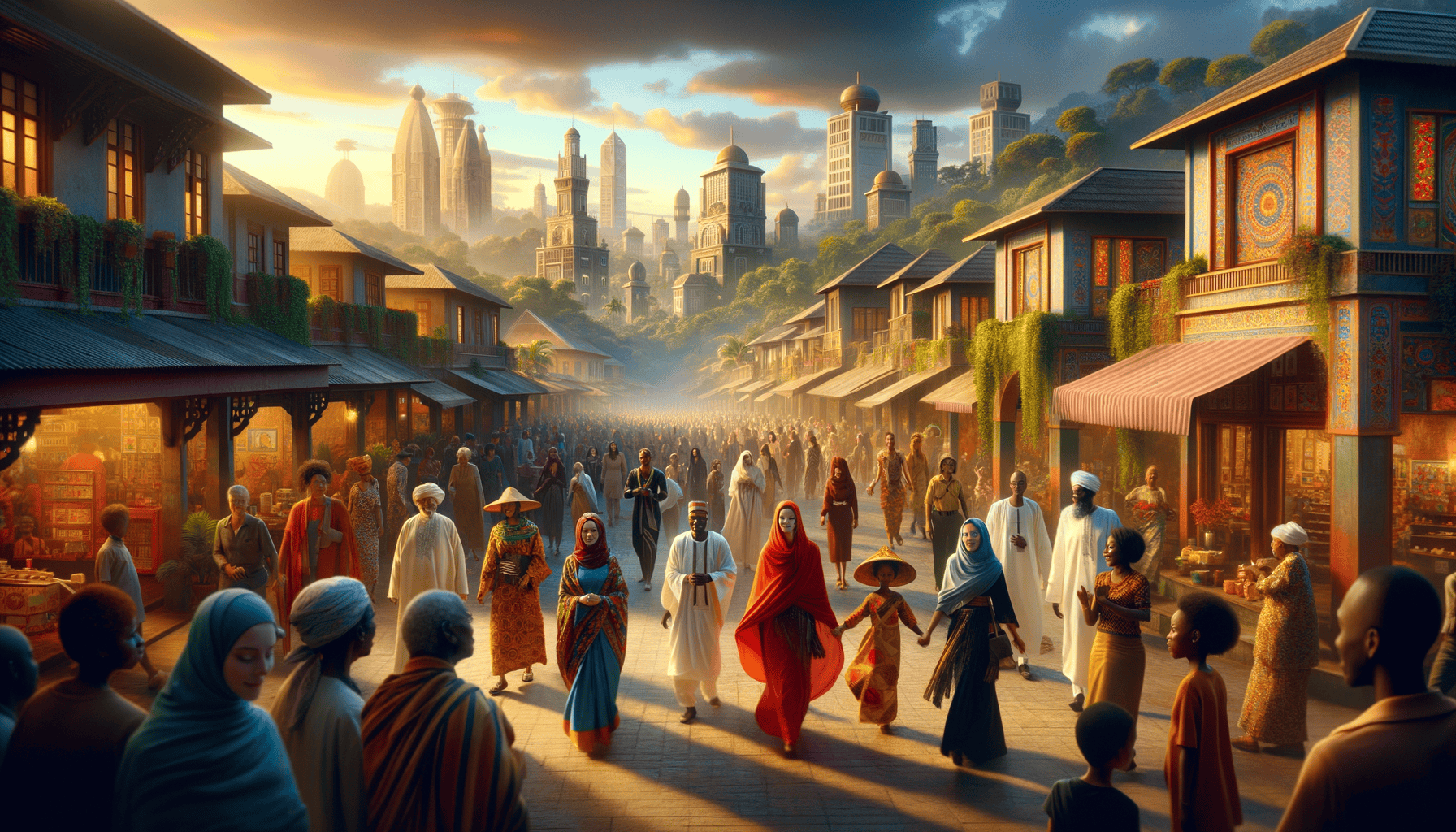The Land of Ancient Kings
Long ago, in a beautiful land called Ivory Coast, many great kingdoms lived side by side. This special place was home to brave warriors, wise leaders, and talented artists who made the most beautiful things you could imagine.
The People of the Land
"Come, little one," says Grandmother Ama, sitting under a tall baobab tree. "Let me tell you about our ancestors who lived in this magical place."
The land was home to different groups of people. The Akan people were known for their beautiful gold jewelry. The Mandé were great traders who traveled far and wide. The Kru were amazing sailors who knew all about the sea.
Life in the Kingdoms
In the Gyaaman kingdom, people lived in houses made from clay and wood. Children played in village squares while their parents worked in fields or made beautiful crafts. The Bouna kingdom was famous for its brave hunters and farmers who grew yams and corn.
"What did the children do back then?" asked little Kwame.
Grandmother Ama smiled. "They learned important things from their elders. Boys learned to farm and hunt, while girls learned to cook special dishes and weave beautiful cloths. Everyone had a special job to help their community."
Trading and Working Together
The kingdoms didn't stay separate – they worked together! People from different kingdoms met at big markets to trade:
• Gold from the forests
• Salt from the north
• Beautiful cloth made by skilled weavers
• Spices and food from farmers
• Tools made by clever craftsmen
Stories and Traditions
Every evening, families would gather to share stories. These weren't just any stories – they were special tales passed down from grandparents to parents to children. They taught important lessons about being brave, kind, and wise.
“Our stories are like precious jewels,” Grandmother Ama says. “They shine brighter each time we share them.”
The Wisdom of the Elders
In each kingdom, wise elders helped make important decisions. They would sit under big trees and listen to everyone's problems. Then they would think carefully before making choices that would help the whole community.
"Were the elders like teachers?" Kwame asked.
"Even better!" Grandmother Ama replied. "They were like living libraries, carrying all our people's knowledge in their minds and hearts." ❤️
Celebrations and Festivals
The most exciting times were during festivals! People would dress in their brightest clothes and dance to drums that echoed through the villages. Everyone shared delicious foods and celebrated together, no matter which kingdom they came from.
Young Kwame's eyes sparkled as he listened to these tales of the ancient kingdoms. He could almost see the golden crowns glinting in the sun and hear the festival drums beating in the distance. These stories weren't just about the past – they were about who his people were and who they could become.
As the sun began to set, casting long shadows across the village, Grandmother Ama patted Kwame's head. The ancient kingdoms might be gone now, but their spirit lived on in the hearts of their descendants. The wisdom, courage, and creativity of those times continued to inspire new generations of children like Kwame.
Winds of Change
The warm African sun sparkled on the ocean waves as strange ships appeared on the horizon. These ships brought visitors from far across the sea who would change life in the Ivory Coast forever.
First Meetings
“Tell me about when the ships first came,” young Kwame asked his grandmother Ama, his eyes wide with curiosity.
“Ah,” Grandmother Ama nodded, “it was a time of great wonder and worry. The Portuguese sailors were the first to arrive in their big wooden ships. The local people had never seen anything like them before!”
Trading Times
More and more ships began to visit the coast. They came from different European countries like France, England, and Holland. The visitors wanted many things from our land:
• Gold that sparkled in the sun
• Ivory from elephant tusks
• Spices that made food taste good
• Wood from our mighty forests
• Cotton for making clothes
Dark Days
Grandmother Ama’s face grew sad. “Not all the trading was good, little one. Some bad people came who took away our brothers and sisters to work in far lands. It was a very sad time.”
“But our people were strong. They fought back and helped each other stay safe.”
New Ways of Life
The European visitors brought new things to the Ivory Coast:
“What are those?” Kwame pointed to the coffee plants growing nearby.
“Those came from the Europeans,” Grandmother Ama explained. “They taught us to grow coffee and cocoa. Now our land grows some of the best cocoa in the whole world!”
Changes in the Villages
Life in the villages began to change. People learned new languages to talk with the traders. They used different kinds of money instead of trading goods. Some people moved to new towns near the coast to work with the Europeans.
Keeping Our Ways
“Did our people forget their old customs?” Kwame worried.
Grandmother Ama smiled and shook her head. “No, little one. Even with all the new things, we kept our special traditions. We still told our stories, played our music, and respected our elders.”
She picked up her wooden drum and tapped out a gentle rhythm. “Our drums still speak the same language they did before the ships came.”
Learning and Growing
The people of Ivory Coast learned many new things from the Europeans. They built different kinds of houses and roads. Some children went to new schools where they learned to read and write.
“Was it hard to learn new ways?” Kwame asked.
“Sometimes,” Grandmother Ama nodded. “But our people were clever. They took the good things they learned and mixed them with our own wise ways.”
Looking Forward
As the evening stars began to twinkle, Grandmother Ama pulled Kwame close. “Those times brought big changes to our land. Some were good, and some were bad. But through it all, our people stayed strong and proud.”
The cool evening breeze carried the smell of cooking fires from the village. Somewhere, a mother was singing an old song to her baby – the same song that had been sung for hundreds of years. Even with all the changes, some things stayed the same.
Under French Rule
The sun rose over a changed Ivory Coast. French flags now flew where village banners once waved. Little Kwame watched as new people in strange clothes walked through his village.
A New Boss in Town
“Grandmother Ama, why are these people telling everyone what to do?” Kwame asked, hiding behind his grandmother’s colorful dress.
“The French have come to rule our land,” she explained softly. “They say they want to teach us their ways.”
Brave Hearts
Not everyone liked the new French rules. Many village chiefs stood up to protect their people’s ways.
“Tell me about the brave ones, Grandmother!” Kwame begged.
Grandmother Ama’s eyes sparkled. “Ah, like Queen Abla Pokou! When the French came, she led her people to safety. She was so brave and smart!”
New Schools, New Rules
The French built different kinds of buildings in the villages. They made schools where children learned to speak French.
“They taught us to read and write in their language, but we still spoke our own words at home.”
Working the Land
The French wanted farmers to grow special crops:
• Coffee beans
• Cocoa for chocolate
• Bananas
• Cotton
• Palm oil
“It was hard work,” Grandmother Ama remembered. “But our people learned to grow these new plants very well.”
City Life Changes
Big cities started to grow. The French built new roads and buildings. Some looked very different from the traditional houses.
“What’s that tall building?” Kwame pointed to a stone structure.
“That’s their church,” Grandmother explained. “Some of our people started going there to pray, while others kept our old ways of worship.” ⛪
Missing the Old Days
Sometimes, the older people would gather and talk about how things used to be. They missed their traditional ceremonies and the way village chiefs made decisions.
Learning to Live Together
“Was everyone angry with the French?” Kwame asked.
“Not always,” said Grandmother Ama. “Some of our people learned good things from them. And some French people learned from us too!”
New Jobs, New Skills
People started doing different kinds of work. Some became teachers or clerks. Others learned to build with new tools and materials.
“Your grandfather learned to be a carpenter,” Grandmother Ama said proudly. “He could make beautiful things with wood using both old and new ways.”
Growing Together
As the years passed, people found ways to keep their traditions while living under French rule. They spoke French at school but told old stories at home. They worked in new jobs but danced traditional dances at festivals.
“Like this drum?” Kwame patted the old drum beside him.
“Yes!” Grandmother laughed. “That drum has been in our family for generations. Its beats tell stories from long ago, and it still sings today!”
Hope for Tomorrow
The evening air filled with the smell of dinner cooking. Kwame helped his grandmother prepare the meal, using both traditional spices and new ingredients from the French markets.
“We are like this stew,” Grandmother Ama said wisely. “We take the new and the old and make something good from both.” She stirred the pot and smiled. “That’s how we stayed strong.” ✨
Dreams of Freedom
The year was 1945, and change was in the air. Young Kofi sat under a mango tree, listening to his uncle Jean talk about a new word everyone was whispering: “Independence.”
A Special Leader
“Who’s that man in the picture, Uncle?” Kofi pointed to a newspaper photo.
“That’s Félix Houphouët-Boigny,” Uncle Jean smiled. “He’s fighting for our freedom. He wants Ivory Coast to rule itself!”
People Power
More and more people started talking about independence. They had meetings under big trees and in village squares.
“We want to make our own choices!” they said.
“We can run our country ourselves!” others agreed.
Working Together
Different groups joined hands to work for freedom:
• Village chiefs
• Young students
• Farmers
• Teachers
• Market workers
Changes Coming
“Look, Kofi!” Uncle Jean pointed to new buildings going up. “We’re getting ready to run our own country.”
People were learning new jobs. They studied how to be:
“Leaders, teachers, doctors, and business owners – we’re preparing for our future!”
Dancing for Joy
The streets filled with music and dancing. People sang songs about freedom in all their languages.
“Why is everyone so happy?” Kofi asked.
“Because we’re close to being free,” Uncle Jean explained. “Soon we’ll make decisions for ourselves!”
Getting Ready
People started learning about:
• How to vote
• How laws work
• How to run a government
• How to work with other countries
Special Day Coming
Everyone knew something big was about to happen. They could feel it in the air.
“When will we be free, Uncle?” Kofi asked one evening.
“Soon, little one. Very soon.” Uncle Jean’s eyes sparkled with hope.
New Flag, New Start
People started making orange, white, and green flags – the colors of their soon-to-be free country.
“These colors tell our story,” Uncle Jean explained. “Orange for our land, white for peace, and green for hope.”
Building Dreams
In villages and cities, people talked about what they wanted for their new country:
“Good schools for all children!”
“Better roads to connect our towns!”
“More hospitals to keep people healthy!”
Almost There
By 1960, excitement filled the air. Freedom was so close they could taste it!
“What happens when we’re independent?” Kofi wondered.
“We’ll work hard,” Uncle Jean said, “but we’ll work for ourselves, building the country of our dreams.”
Looking Forward
The sun set over Ivory Coast, painting the sky in beautiful colors. Kofi and Uncle Jean watched as stars began to twinkle.
“Tomorrow will be better,” Uncle Jean said softly. “Because tomorrow, we write our own story.” ⭐
Time of Growth
The sun rose bright on August 7, 1960. Little Ami watched from her window as people filled the streets of Abidjan with joy.
Sweet Success
“Mama, why are there so many cocoa trees?” Ami asked, walking through their farm.
“These trees are special,” Mama smiled. “They help our country grow strong and rich!”
Building a Nation
President Félix Houphouët-Boigny had big plans. New buildings rose into the sky. Roads stretched across the land. Schools opened their doors to happy children. ️
“Look how our city is growing!” Ami’s father pointed to the tall buildings.
“We’re building not just buildings, but dreams for tomorrow!”
Working Together
People from different parts of the country came to help build the new nation:
• Farmers grew food and cocoa
• Teachers taught in new schools
• Builders made roads and houses
• Doctors helped in new hospitals
• Artists shared their beautiful work
City of Light
Abidjan grew into a beautiful city. People called it the “Paris of Africa.”
“Why is everything so bright?” Ami asked one evening.
“Because we have electricity now,” her father explained. “Our city shines like stars!”
Learning and Growing
In Ami’s classroom, children learned about:
“Reading and writing!”
“Math and science!”
“History and culture!”
Sweet Business
The cocoa farms made Ivory Coast famous around the world.
“People everywhere love our chocolate,” Mama explained while drying cocoa beans.
“Even in far-away places?” Ami asked.
“Yes, especially in far-away places!”
Happy Hearts
Music filled the air as people celebrated their success:
“Our farms are growing!”
“Our children are learning!”
“Our future is bright!”
Helping Others
Ivory Coast became a leader in West Africa. Other countries came to learn from their success.
“Why do people visit us?” Ami wondered.
“Because we’re showing how to build a strong country,” her father said proudly.
Growing Pains
Sometimes things were hard. Not everyone had the same chances. Some people worried about the future.
“We must work harder,” the president said. “To make sure everyone can share in our success.”
Looking Ahead
As the golden years continued, Ami grew taller, just like her country. She dreamed of helping build an even better tomorrow. ⭐
“What will you do when you grow up?” Mama asked.
“I want to help our country stay strong and beautiful,” Ami said, watching the sunset paint the sky in orange, white, and green.
Dreams of Tomorrow
The warm African sun spread its rays over modern-day Ivory Coast. Young Koffi sat under a mango tree, listening to his grandmother tell stories.
New Voices
“Things have changed so much,” Grandma smiled, her eyes twinkling with memories. “But our spirit stays strong!”
Moving Forward
Koffi walked through busy streets where old and new mixed together:
• Modern phones and ancient wisdom
• Traditional markets and new shopping centers
• Historic buildings and shiny skyscrapers
• Old songs and new music
• Village crafts and digital art
Growing Together
“Look at our beautiful country,” Papa said, pointing to green forests and busy cities. “We faced hard times, but we never gave up.”
“Like a strong tree, we bend with the wind but never break!”
Sweet Future
In the cocoa fields, farmers learned new ways to grow better crops.
“We’re making our chocolate even better,” explained Mr. Yao, a young farmer. “And taking care of our land too!”
Learning Never Stops
“I can talk to students around the world!” Koffi said excitedly about his school’s new computer lab.
Peace and Friends
People from different groups work together now more than ever.
“When we share our different songs, dances, and stories,” said Koffi’s teacher, “we make something beautiful together.”
Green Dreams
Young people like Koffi care about nature. They plant trees and clean beaches.
“We want our children to see the same beautiful forests we see,” said Ami, now grown up and leading environmental projects.
City Lights
Abidjan keeps growing prettier and stronger. New buildings shine in the sun. ️
“Our city shows what Africa can be,” smiled Mr. Kouassi, a city planner. “Modern but still African at heart.”
Dancing Forward
Music still fills the streets – both old drums and new beats. People dance together, celebrating their past and future.
“Our story isn’t over,” Grandma told Koffi. “It’s just beginning!”
Tomorrow’s Promise
The sun set over Ivory Coast, painting the sky in beautiful colors. Koffi looked at his homework about his country’s history.
“From ancient kingdoms to modern cities,” he wrote, “we keep growing stronger. Our dreams are big, our hearts are brave, and our future is bright!”
As stars appeared in the sky, Koffi thought about all the stories – from old kingdoms to today’s busy streets. Each chapter added something special to Ivory Coast’s amazing story. And the best part? There are still many wonderful chapters waiting to be written! ⭐


